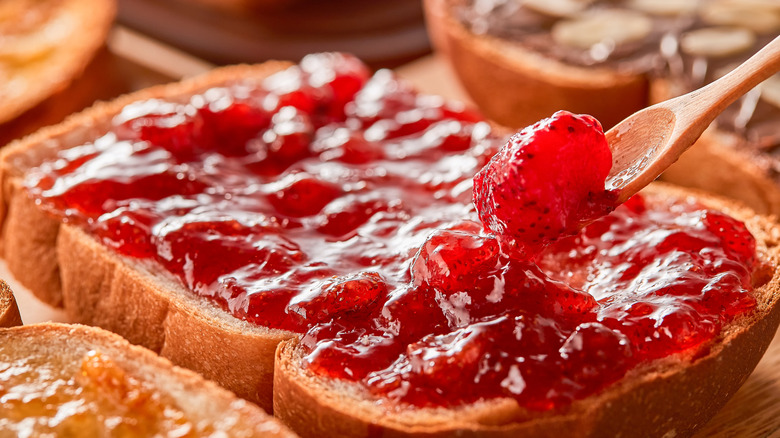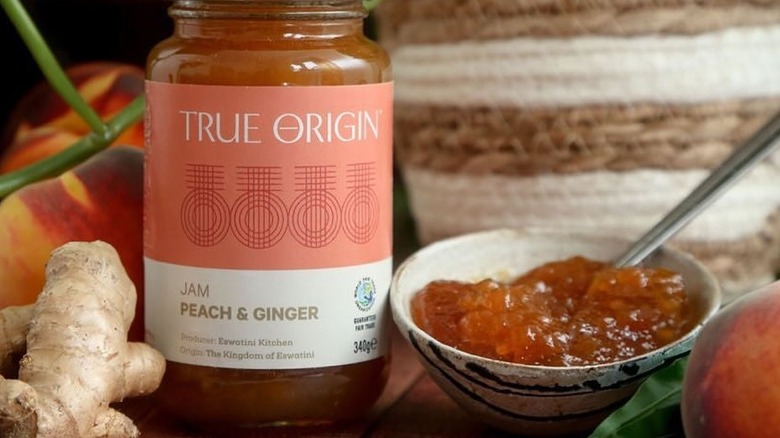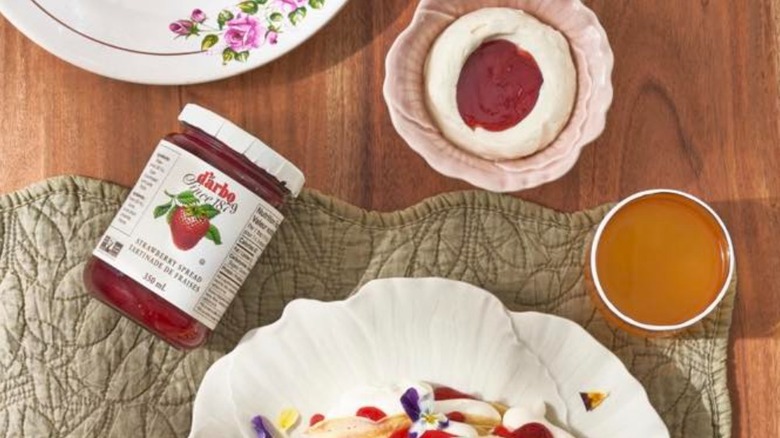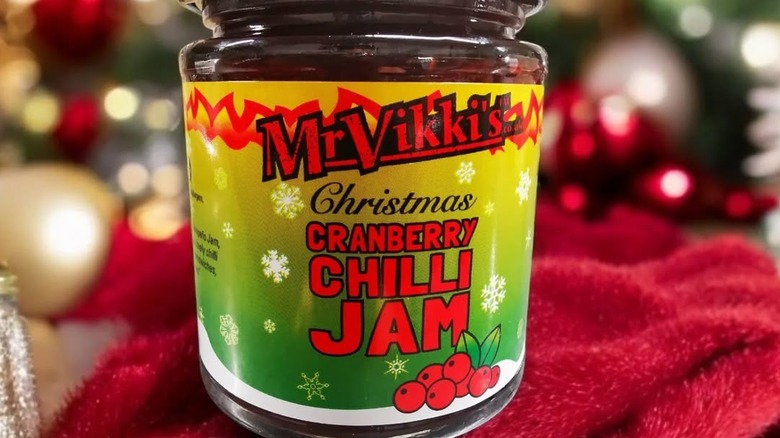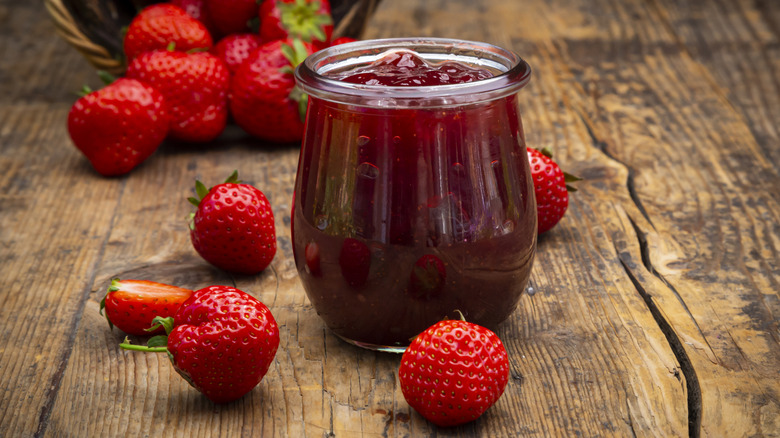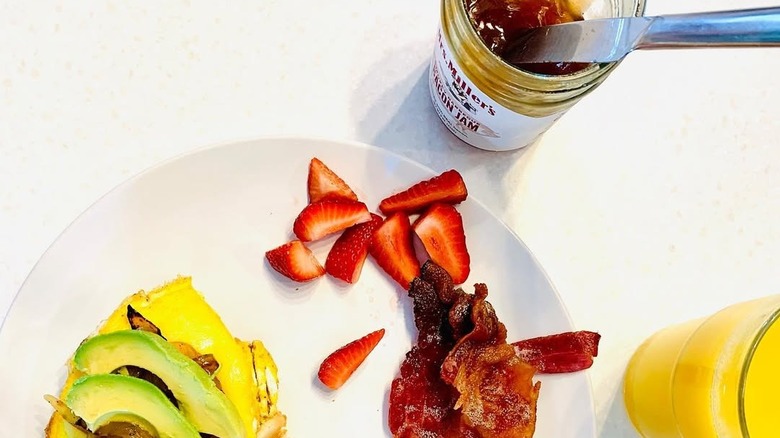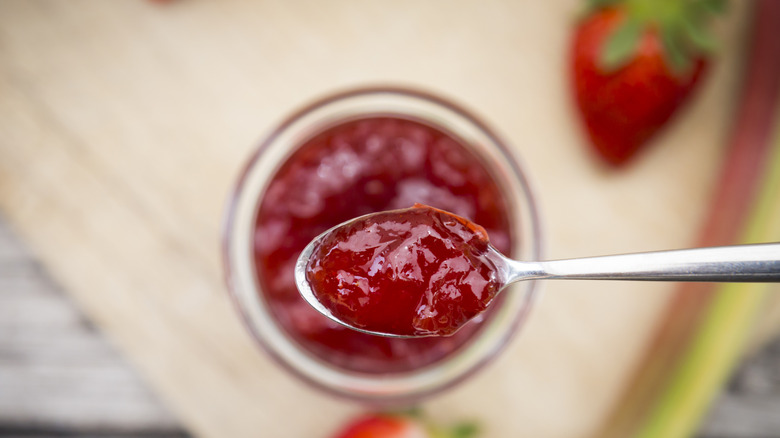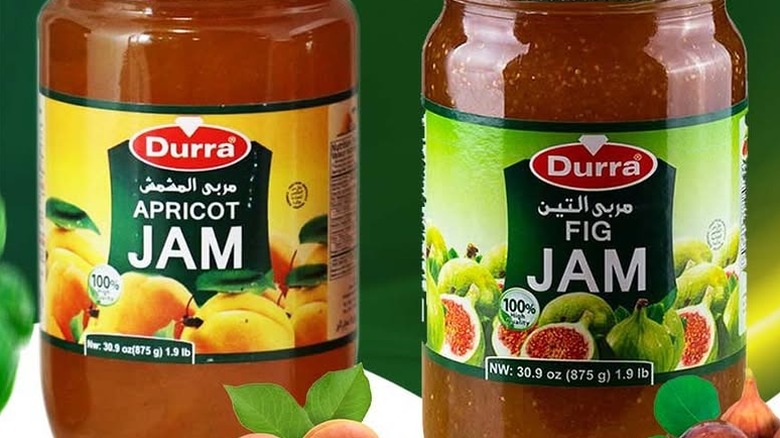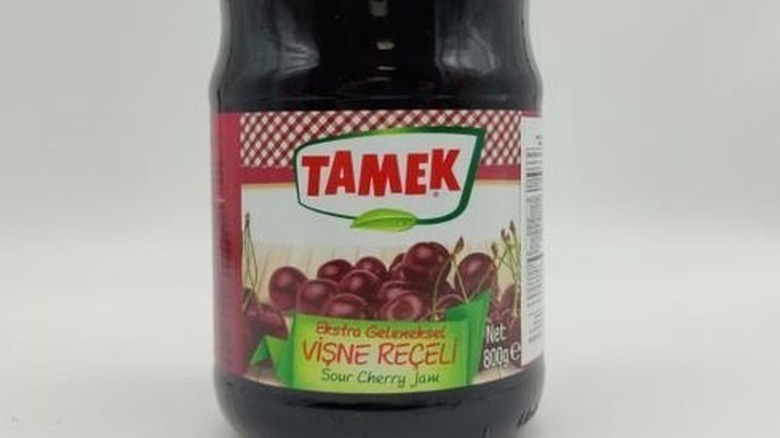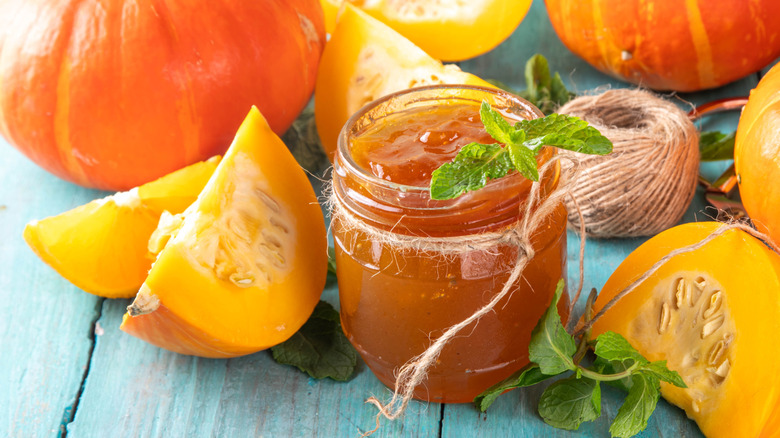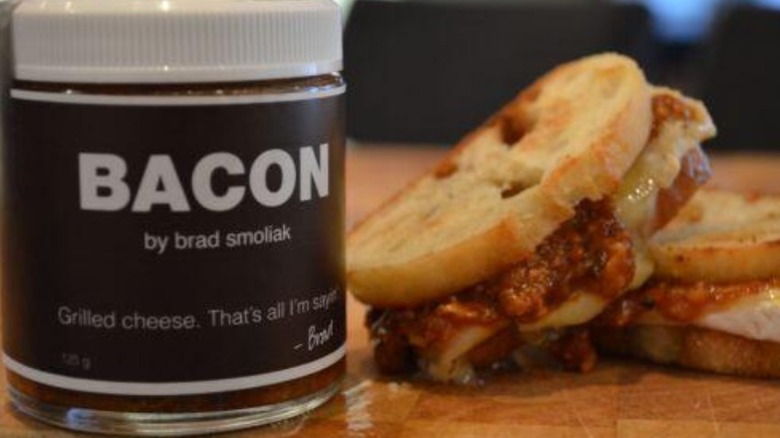The Biggest Recalls In Jam History
When it comes to toast, sandwich fillings, and cake, jam is a go-to ingredient for people all over the world. Research suggests that more than 294 million Americans consumed some type of jam or jelly in 2020, and nearly 18 million Brits enjoyed the spread in 2023. Jam is popular for a few reasons — it's sweet, versatile, comforting, and typically an easy way to get some of the antioxidant benefits of berries. But sadly, like many foods, jam is not perfect.
Over the years, there have been many different jam recalls in places — not just in the U.K. and the U.S. but other countries, too. In a few instances, this is due to mold; in others, it's because undeclared allergens, like soy, have somehow made their way into the product. In some cases, jam was recalled due to fears of dangerous bacteria, like listeria (which can lead to life-threatening listeriosis) or Clostridium botulinum (the cause of a dangerous disease called foodborne botulism).
But jam-lovers, don't panic. Food safety authorities are often quick to pull affected products off the shelves before they can wreak any havoc on the health of consumers. Below, we've listed some of the biggest jam recalls in history, from small, fair trade brands to major supermarket chains.
True Origins jam in 2024
In November 2024, Scottish fair trade brand True Origin recalled its Peach & Ginger Jam from the market due to mold contamination. In December, it expanded the recall to include several more products, including Lime Marmalade, Ruby Grapefruit Marmalade, Orange Marmalade, and Orange and Cinnamon Marmalade. All of the jams and preserves were produced by Eswatini Kitchen, one of the brand's fair trade partners in Eswatini in Southern Africa.
Mold is a type of fungus. It can grow on anything, from the walls of your home to the jam in your pantry. But if you see mold on your food, it's best not to eat it. This is for a few reasons. Firstly, some types of mold are allergens, which means they could cause a dangerous allergic reaction in some people. They can also produce mycotoxins, which, if consumed, could lead to symptoms like nausea and vomiting.
While it may be tempting to cut around the mold and eat the food that looks fine, this is not the best course of action. Mold is not always visible, and it may have roots growing throughout the food that you can't easily see. This is why True Origin urged anyone who had already bought the jam to avoid consuming it and instead dispose of it or return it for a refund.
D'arbo strawberry jam in 2024
Also in 2024, Austrian company A. Darbo AG (more commonly known by its brand name D'arbo) was forced to recall its 70% Fruity Garden Strawberry jam — also called Double Fruit Spread Garden Strawberry — due to internal reports that the surface of some of the jars had started to grow mold. At the time of the recall, the jams had already been sent to several global markets, including Hong Kong. Anyone who had already purchased the products was urged not to consume them and instead either dispose of the jam or return it to the store they purchased it from for a refund.
To avoid ill effects, no-one should consume food with mold. But experts maintain that vulnerable people like the elderly and those with a weakened immune system, in particular, should be careful of consuming anything that is showing signs of spoilage. This is because of the mycotoxins, which can cause adverse reactions. On top of this, the mycotoxins in some mold may even present a chronic disease risk. The chemicals, which are naturally occuring, can increase the risk of reproductive disorders, for example, as well as liver and kidney damage. Some are even linked to cancer. Aflatoxins, for example, are a type of carcinogenic mycotoxin that have been found in foods like maize, nuts, figs, vegetable oils, cocoa beans, and even jams.
Various Mr Vikki's chilli jam products in 2024
November 2024 was a big month for jam recalls. Condiment brand Mr Vikki's also had to recall three of its chilli jam products, including its Christmas Cranberry Chilli Jam, from the market as they contained peanuts that were not declared on the packaging. The recall also affected almost 200 other products from more than 40 different brands, including relishes, dips, curry powders, and some pre-prepared meals. The problem? They contained a spice mix made with mustard, which could contain peanuts. Mr Vikki's sells its products in more than 40 stores across the U.K.
Not declaring peanuts on product packaging is a serious health risk. Tree nut and peanut allergies are common in the U.K., affecting around one in every 50 children and one in 200 adults. If a person with a peanut allergy were to consume the chili jam or any of the other affected products, they may experience symptoms like rashes, itching, swelling, or stomach pain. In some cases, anaphylaxis could occur, which can be life-threatening. It's important to note, however, that anaphylaxis is extremely rare.
Recalls are one key way of keeping people safe from allergens and harmful reactions. In fact, undeclared allergens are one of the most common causes of recalls in the U.K., accounting for more than half of all recalls in the country. They are also a common cause of recalls in the U.S. — several American recall announcements were due to undeclared allergens in 2024.
Iceland recalled various wild strawberry jams in 2024
Also in 2024, the Icelandic Food and Veterinary Authority issued a recall for wild strawberry jam products. This time, it wasn't due to undeclared allergens or mold, but dangerous foodborne bacteria listeria. If consumed, food products contaminated with listeria can lead to listeriosis, which is a bacterial infection with symptoms like fever, diarrhea, and vomiting. For vulnerable individuals, like the elderly and people with compromised immune systems, it can be fatal. It is also particularly dangerous for pregnant people, as it can lead to birth complications and even miscarriage.
Because of how serious it is, listeria has been the cause of a number of major recalls in the past. It is often found in deli meat products and smoked fish, but, as this recall in Iceland proves, fruit products like strawberry jam can also be contaminated with the bacteria.
Listeria can also live on fresh fruit. In 2011, the bacteria led to a major recall of cantaloupes from the U.S. market. The fruit, which was produced by Jensen Farms in Colorado, was the source of a major disease outbreak, which affected nearly 150 people. It also led to 33 deaths and one miscarriage. More than a decade after this incident, in 2022, California company HMC Farms issued a recall for peaches, nectarines, and plums due to Listeria concerns. Unfortunately, this contamination also led to devastating consequences. Around 12 people developed serious listeriosis and one person died.
Mrs Miller's Homemade Jams in 2022
In 2022, Ohio company Mrs Miller's Homemade Jams issued a voluntary recall due to the presence of soy in its Smokey BBQ Bacon Jam and Spicy Chili Bacon Jam. The products had been made with worcestershire sauce and hickory smoke, which contained soy that had not been declared on the packaging. Like peanuts, soy is an allergen. It is most common in children, although it can affect adults, too. Research suggests that around 0.4 percent of young children in the U.S. have a soy allergy. Like all allergies, the symptoms can vary. For some, they will be mild, and may include itching, tingling, or nausea, for example, but for a few, eating soy could result in life-threatening anaphylaxis. The latter usually involves symptoms like a swollen tongue, difficulty breathing, fainting, blue skin, and coughing.
At the time of the recall, Mrs Miller's Homemade Jams had been sent to more than 40 markets and general stores across Ohio. Some were sent further afield, to stores in Arizona, North Carolina, Minnesota, Georgia, and California, for example. Fortunately, there were no allergic reactions (either severe or mild) reported as a result of the undeclared soy in the bacon jams. However, the Food and Drug Administration urged anyone who was concerned about consuming the jam to contact their healthcare provider immediately. They also urged allergy-sufferers to throw away the product and contact Mrs Miller's Homemade Jams for a replacement or refund.
Carrefour strawberry jams in 2022
In 2022, more than 5,000 Carrefour stores in France voluntarily recalled strawberry jams from shelves across the country due to concerns they were contaminated with plastic. If consumed, they could present a choking hazard, or cause internal injuries, depending on how sharp the pieces of plastic are. In some cases, these injuries could even require treatment for an infection or surgery to remove the plastic. This is why Carrefour urged anyone who had already bought its Carrefour Original Strawberry Jam to either dispose of it or return it to one of its stores for a full refund.
There are a few ways plastic can enter the food system. Often, it happens due to employee error in the processing factory, broken machinery, or broken packaging materials. Unfortunately, plastic contamination is not unusual. In fact, it is the most common foreign object to find its way into food products. The most common injuries due to hidden foreign objects in food, including plastic but also contaminants like metal, glass, and stones, include broken teeth, mouth cuts, and choking.
As a major grocery store chain, Carrefour, which has more than 14,000 stores around the world, has been caught up in a number of food recalls in the past. In March 2025, it had to recall more of its own-brand products from the shelves. This time, it wasn't jam, but boiled chicken that was at risk of containing Salmonella bacteria.
Durra apricot jams in France due in 2021
In 2021, there was another jam recall in France. This time it wasn't Carrefour, but international food company Durra, which had supplied apricot jams to stores across the country. The brand had to recall the products from 14 distributors as they contained undeclared sulfites.
Sulfites are a common type of preservative used in many foods. In a nutshell, they help to stop food products from spoiling and help to extend their shelf life. This is why they're often used in wine production, for example, they help to slow down the oxidation process and help the drink to last longer without going bad. However, for some people, sulfites are more of a hazard than a help.
People with asthma, in particular, are at risk of having a sulfite allergy or sensitivity, which means that if they consume anything that contains them, they could experience symptoms like hives, wheezing, and even difficulty breathing. In fact, research suggests that up to 10% of people with asthma — which is a common condition that affects the lungs — have a sensitivity to sulfites. This is because sulfites produce a gas called sulphur dioxide, which can irritate the airways and the lungs. To be on the safe side, anyone who had already purchased the apricot jam from Durra was urged not to consume it. The company was also instructed to change the labeling of its apricot jams if the presence of sulfites was ongoing.
Tamek sour cherry jams in 2020
In Canada in 2020, Turkish company Tamek, which specializes in products like sauces, canned foods, pickles, jams, and marmalades, recalled its Sour Cherry Jam with Pectin from stores in British Columbia, Ontario, and Quebec. It did so not because of allergens or bacteria, but because the jams contained a part of the cherry that no-one wants to eat: the pits.
Cherry pits (that's the hard stones inside a cherry) shouldn't be consumed for a few reasons. Firstly, because they are small and hard, they are a choking hazard, particularly for children and infants. But aside from this, in rare cases, they could also cause internal blockages and may even lead to obstructions in the colon, which could require surgery to remove. And the final reason nobody should eat cherry pits? They're actually poisonous.
Like many fruits, including apples, pears, plums, and apricots, the stones in cherries contain cyanide compounds. Cyanide is an incredibly toxic natural chemical, and for that reason, it has even been used as a war weapon. But don't panic too much, if you consume a few cherry pits, you're unlikely to experience poisoning — the small amount of cyanide they contain will stay within the pit (unless chewed). However, you could still experience a few symptoms as a result, including headaches and in serious cases, seizures and difficulty breathing. This is why it's best to be on the safe side and why Tamek quickly pulled its products from the market.
My Grandfather's Farm pumpkin pie jam in 2020
Also in 2020, Canadian brand My Grandfather's Farm had to recall its Pumpkin Pie Jam from the market in Nova Scotia due to fears it could grow a type of toxic bacteria called Clostridium botulinum. Tests conducted by the Canadian Food Inspection Agency triggered the recall of the products. If consumed, Clostridium botulinum could lead to foodborne botulism, a serious and life-threatening disease.
Many types of foodborne bacteria, like Listeria, E.coli, or Salmonella, produce gastrointestinal symptoms. But Clostridium botulinum is different, as it is a neurotoxin. This means that it tends to impact the nervous system, producing symptoms like slurred speech, double vision, drooping eyelids, and even paralysis. If it is not treated, botulism can be fatal. Clostridium botulinum tends to grow in canned or jarred foods, like tomatoes, juices, sauces, and, of course, jams. Botulism can also occur when the spores of the bacteria get into a wound. In very rare cases, it can occur from Botox treatments (Botox is made from the same bacteria that can cause the severe food poisoning, Clostridium botulinum).
Due to the risks from Clostridium botulinum, anyone who had already bought pumpkin pie jam from My Grandfather's Farm was urged not to consume it. Instead, customers were instructed to either dispose of the jam or take it back to the store where they bought it from for a refund.
Kitchen by Brad Smoliak bacon jam in 2014
Clostridium botulinum has been causing recalls for decades. In fact, it was the reason for the first ever major recall in the U.S. in 1920, when concerns arose over the bacteria's presence in canned olives. In 2014, six years prior to the recall from My Grandfather's Farm, another Canadian brand had to recall jam due to concerns that it could grow Clostridium botulinum. This time, the affected brand was Edmonton-based Kitchen by Brad Smoliak and the product was a type of bacon jam, called Bacon By Brad Smoliak, sold across Alberta. Again, customers were told to immediately dispose of the product or return it for a full refund.
Foodborne botulism, which is the illness caused by the bacteria, is rare, but it does happen. In 2019, for example, there were 215 reported cases of botulism in the U.S., and around 10% of those were caused by food (the others were related to infant botulism or wound botulism). The cases were related to three different foods: Store-bought roasted potatoes, store-bought preserved peppers, and home-prepared fermented beluga flipper. The latter was prepared in Alaska, where beluga flipper is a traditional Native American food.
